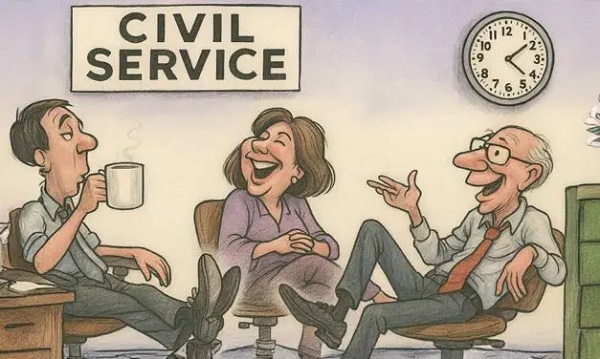Business
As inflation jumps to 3.3 per cent in July, economists say uptick is bad news for BoC

Statistics Canada released its July consumer price index report this morning, with a 3.3 per cent inflation rate. The rise in the pace of growth since June was led by gasoline prices. Gas prices are displayed in Carleton Place, Ont. on Tuesday, May 17, 2022. THE CANADIAN PRESS/Sean Kilpatrick
By Nojoud Al Mallees in Ottawa
Canada’s annual inflation rate rose to 3.3 per cent in July, as economists warn the latest consumer price index report spells bad news for the Bank of Canada.
The uptick in price growth comes after inflation tumbled to 2.8 per cent in June, falling within the Bank of Canada’s target range of between one and three per cent for the first time since March 2021.
“There’s no sense sugar coating this one — it is not a good report for the Bank of Canada,” said BMO chief economist Douglas Porter in a note to clients.
Inflation ticked up last month because gasoline prices fell less dramatically on a year-over-year basis than they did in June, Statistics Canada said.
After a significant run-up in energy prices prompted by the Russian invasion of Ukraine, lower gasoline prices have largely driven the decline in inflation over the last year.
Now, other underlying price pressures need to ease for inflation to fall further. Porter notes gasoline prices are on pace to rise by five per cent in August.
The latest report has raised the odds of a rate hike next month, according to forecasters, despite other signs of economic softening, including rising unemployment.
And while Porter still expects the Bank of Canada to stay on the sidelines, he says “the inflation figures will make it a tougher call.”
Excluding energy prices, the consumer price index decelerated to 4.2 per cent, down from 4.4 per cent in June.
Meanwhile, grocery prices rose 8.5 per cent on an annual basis. The federal agency says prices rose more slowly than June’s 9.1 per cent, largely due to smaller price increases for fruit and bakery goods.
Prices for travel-related services also slowed or declined compared to a year ago. Airfare, for example, was down 12.7 per cent since July 2022.
The Bank of Canada expects inflation to hover around three per cent over the next year, before steadily declining to two per cent by mid-2025.
This longer trajectory back to the inflation target prompted the central bank to raise interest rates again in July, bringing its key rate to 5.0 per cent.
The rapid rise in interest rates has fed into higher mortgage interest costs, which Statistics Canada says continue to be the largest contributor to inflation.
Mortgage interest costs posted another record year-over-year increase in July, rising by 30.6 per cent.
The central bank is hoping households facing higher shelter costs due to rising interest rates to pull back on spending elsewhere and thereby slowing inflation.
The Bank of Canada is set to make its next interest rate decision on Sept. 6.
This report by The Canadian Press was first published Aug. 15, 2023.
Business
Bill C-8 would allow minister to secretly cut off phone, Internet service

From the Canadian Constitution Foundation
“I worry that this law could be used to secretly cut off political dissidents from their phone or Internet service on the pretense that they may try to manipulate the telecom system”
The Canadian Constitution Foundation is concerned about the civil liberties implications of the Carney government’s proposed cyber security bill, C-8, which would allow the minister of industry to secretly order telecommunications service providers like Telus, Bell and Rogers to stop providing services to individual Canadians.
The minister would be allowed to make such an order if she has “reasonable grounds to believe that it is necessary to do so to secure the Canadian telecommunications system against any threat, including that of interference, manipulation, disruption or degradation.”
An individual who does not comply, including by failing to keep the order secret, could face fines of up to $25,000 for the first contravention and $50,000 for subsequent contraventions. Businesses could face fines of up to $10 million for the first contravention and up to $15 million for subsequent contraventions.
The orders would remain secret indefinitely, with the minister required only to present an annual report to Parliament on the number of orders made and her opinion on their necessity, reasonableness and utility.
CCF Counsel Josh Dehaas said that the power to cut off the Internet or cellphone service of Canadians is a “very serious power that requires very strong safeguards, which are presently lacking in the bill.”
“While this power may be necessary in some cases to prevent cyber attacks, it also poses serious risks to civil liberties,” Dehaas said. “I worry that this law could be used to secretly cut off political dissidents from their phone or Internet service on the pretense that they may try to manipulate the telecom system,” Dehaas explained. “Such an action would violate our most cherished freedoms including free speech.”
CCF Litigation Director Christine Van Geyn said that the government cannot be trusted with such a power unless proper safeguards are in place.
“You may think that the idea of the government cutting off political dissidents from the necessities of life sounds far-fetched, but that’s exactly what happened during the 2022 Freedom Convoy protests in Ottawa,” she said. “The federal government ordered banks to freeze hundreds of bank accounts without any judicial authorization, cutting protesters off from their money in the middle of a very cold winter.”
“Although the Federal Court agreed with the CCF that freezing bank accounts this way violated the constitutional right to be secure against unreasonable searches and seizures, that kind of damage isn’t easily repaired,” Van Geyn added.
Ottawa has appealed the Federal Court’s finding. The CCF is awaiting a decision from the Federal Court of Appeal.
Dehaas said that Parliament should consider requiring either judicial pre-authorization or an immediate, automatic judicial review of any decision to cut off an individual or business from their Internet or phone.
The CCF is also concerned that Bill C-8 would allow the minister to weaken telecommunications companies’ encryption standards, allowing for unconstitutional access to Canadians’ private information.
Finally, the CCF is concerned that the bill could allow the minister or any person designated by the minister to engage in unconstitutional searches.
Joanna Baron, the CCF’s Executive Director, said that Canadians must be vigilant about their constitutional rights and freedoms because they can be easily taken away, especially in times of crisis.
“I would encourage Canadians to fight for their freedoms, whether it’s by taking the CCF’s free privacy course, signing up for our weekly Freedom Update newsletter or becoming a monthly donor,” Baron said.
“Concerned Canadians are also encouraged to write to their MPs using our form letter, to tell them to amend these bills to ensure Canadians’ rights to privacy and free expression are protected,” Baron added.
Alberta
Taxpayers: Alberta must scrap its industrial carbon tax

-
Carney praises carbon taxes on world stage
-
Alberta must block Carney’s industrial carbon tax
The Canadian Taxpayers Federation is calling on the government of Alberta to completely scrap its provincial industrial carbon tax.
“It’s baffling that Alberta is still clinging to its industrial carbon tax even though Saskatchewan has declared itself to be a carbon tax-free zone,” said Kris Sims, CTF Alberta Director. “Prime Minister Mark Carney is cooking up his new industrial carbon tax in Ottawa and Alberta needs to fight that head on.
“Alberta having its own industrial carbon tax invites Carney to barge through our door with his punishing industrial carbon tax.”
On Sept. 16, the Alberta government announced some changes to Alberta’s industrial carbon tax, but the tax remains in effect.
On Friday night at the Global Progress Action Summitt held in London, England, Carney praised carbon taxes while speaking onstage with British Prime Minister Keir Starmer.
“The direct carbon tax which had become a divisive issue, it was a textbook good policy, but a divisive issue,” Carney said.
During the federal election, Carney promised to remove the more visible consumer carbon tax and change it into a bigger hidden industrial carbon tax. He also announced plans to create “border adjustment mechanisms” on imports from countries that do not have national carbon taxes, also known as carbon tax tariffs.
“Carney’s ‘textbook good policy’ comments about carbon taxes shows his government is still cooking up a new industrial carbon tax and it’s also planning on imposing carbon tax tariffs,” Sims said. “Alberta should stand with Saskatchewan and obliterate all carbon taxes in our province, otherwise we are opening the door for Ottawa to keep kicking us.”
-

 Censorship Industrial Complex2 days ago
Censorship Industrial Complex2 days agoCanada To Revive Online Censorship Targeting “Harmful” Content, “Hate” Speech, and Deepfakes
-

 Alberta2 days ago
Alberta2 days agoAlberta refuses to take part in Canadian government’s gun buyback program
-

 Business1 day ago
Business1 day agoTaxpayers deserve proof of how politicians spend their money
-

 Business1 day ago
Business1 day agoOttawa’s civil service needs a Chrétien-style reset
-

 Alberta2 days ago
Alberta2 days agoOrthodox church burns to the ground in another suspected arson in Alberta
-

 Fraser Institute1 day ago
Fraser Institute1 day agoAboriginal rights now more constitutionally powerful than any Charter right
-

 Alberta1 day ago
Alberta1 day ago$150 a week from the Province to help families with students 12 and under if teachers go on strike next week
-

 Business1 day ago
Business1 day agoNew PBO report underscores need for serious fiscal reform in Ottawa






